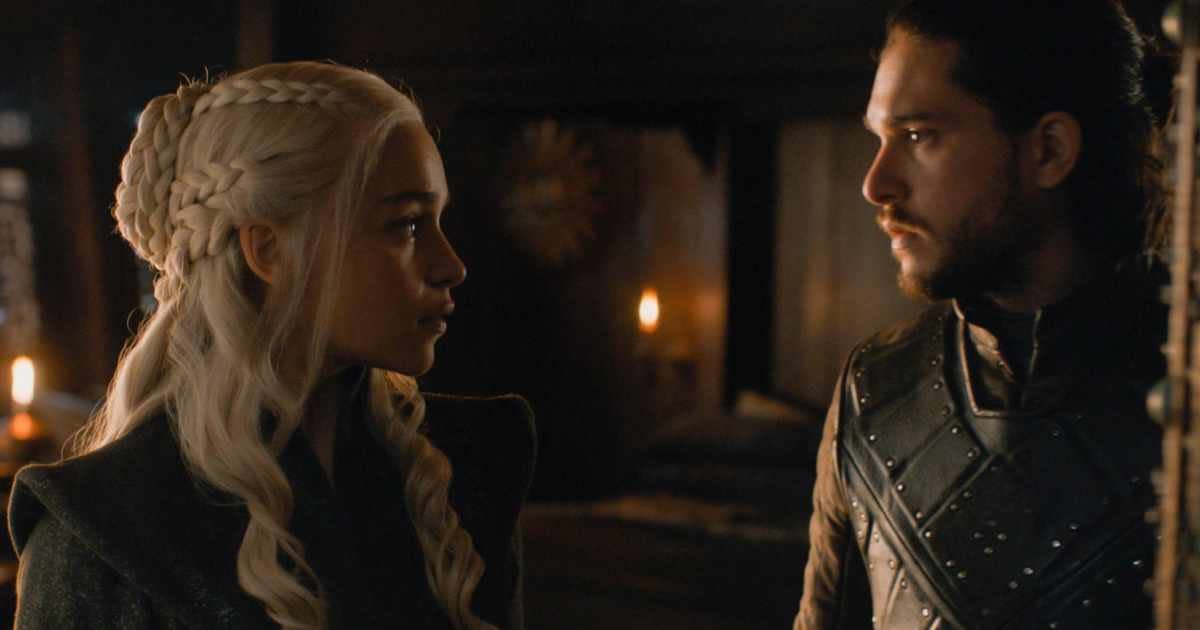Game of Thrones : Why Jon Snow has a better Iron Throne claim than Daenerys

You know that Jon Snow and Daenerys Targaryen have rival claims to the Iron Throne, a fact that’s seemingly going to be quite important during Game of Thrones season 8.
But Jon is said to have a better claim to ruling Westeros than his aunt/lover — even though Daenerys’ father was the former king.
So why is that? Is there some medieval gender bias at play?
Westeros succession law does give inheritance preference to males, but in this case the strength of Jon’s claim mainly rests in the identity of his father.
The logic goes like this: Aerys II “Mad King” Targaryen was on the Iron Throne until he was killed and overthrown during Robert’s Rebellion. Now even if you accept the rebellion as somehow legal (in the books, Robert Baratheon justified his claim by noting that he was a Targaryen cousin), the line of succession has gotten very muddy since as none of Robert’s publicly named offspring were actually his (Joffery, Myrcella, Tommen were all Jaime Lannister’s secret children and are now all dead). Robert’s brothers (Stannis and Renly) are dead too. Robert’s has one known living son, Gendry, but his mother was a commoner. Robert’s wife Cersei has since seized the throne for herself.
So let’s go back to the Mad King then. He had three kids: Rhaegar, Viserys, and Daenerys. Now you might think that since Rhaegar and Viserys are dead, that Dany is the rightful heir, as she’s the last surviving member from that level of the family tree.
But the rule of succession in Westeros is similar to that of Europe (and author George R.R. Martin based his books on medieval European history): Succession passes to eldest trueborn male offspring (unless the heir has no living children).
So the Mad King’s firstborn and heir was Rhaegar, not Daenerys. And Jon Snow, a.k.a. Aegon, is Rhaegar’s only surviving child, so he’s the heir.
If Jon Snow didn’t survive… then Daenerys could claim to be the heir as the last living full Targaryen.
And if Jon becomes king and has a son with Dany, then their child would become the rightful heir.
So because Dany’s older brother was the firstborn and rightful heir, Rhaegar’s children have priority over her, of which none were known to have survived… until now.
If you think about it, if succession wasn’t handled this way, then when a king died their power would shift to one of their siblings after another until they were all gone.
Now you might be wondering: What if a firstborn is female, do they still inherit in Westeros? The answer is typically no, especially if we’re talking about the Iron Throne — there’s a reason why Cersei is the first ruling queen in thousands of years. So gender does come into play, and often. And if that sounds medieval and archaic, you might be interested to know that Britain finally did away with centuries of male bias in Royal Family succession law just eight years ago.
Of course, sometimes a ruler doesn’t want their firstborn son to inherit, which is what happened to Samwell Tarley. His cruel father sent him to join the Night’s Watch so he could give his inheritance to his younger brother Dickon instead.
The other question is: How much does succession law actually matter? Often in Game of Thrones, the laws of succession take a backseat to who has the most power. The Iron Throne is sometimes politely handed down to whoever is the rightful heir, but other times it’s simply seized by whoever can grab it.
Game of Thrones returns tonight! Be sure to check out EW.com as we’ll have deep-dive recaps plus interviews with cast members breaking down some big moments posted through Monday. Bookmark our GoT content hub. Follow @jameshibberd for updates.
Related content:

